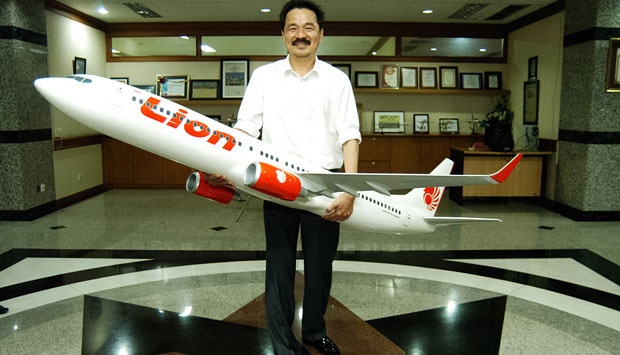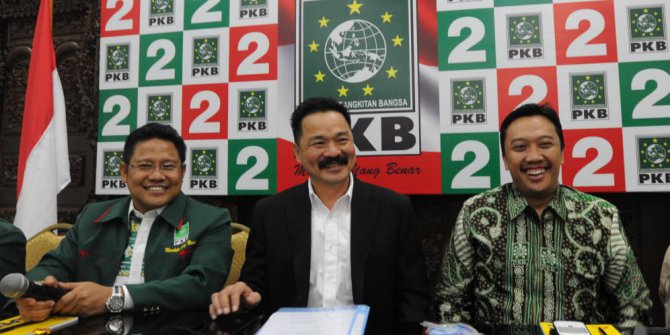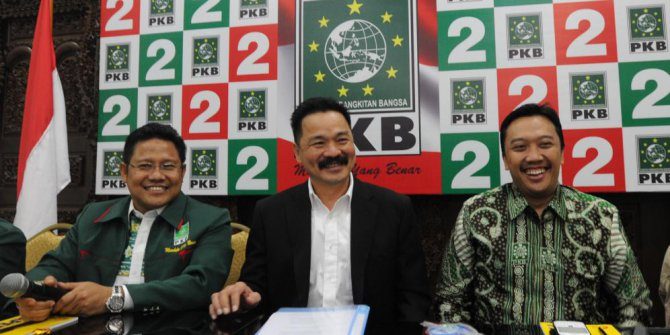If reputable polls are to be believed, Islamic parties are headed for their worst result ever. Four of the five Islamic parties contesting Indonesia’s 2014 election to predicted to suffer a drop in their support. The one exception to this trend is the National Awakening Party (PKB), which was founded in 1998 by Abdurrahman Wahid (‘Gur Dur’), the then chair of Indonesia’s largest Islamic organisation, Nahdlatul Ulama (NU) and later the nation’s fourth president (1999-2001). Surveys suggest PKB is likely to lift its vote to 7-8%, almost double the 4.8% it gained at the 2009 election. If these forecasts hold true, PKB will return to being the largest Islamic party, a title it hasn’t held since the 1999 election.

New deputy chairman of PKB, Rusdi Kirana, in his prior role as President Director of Lion Air. Photo: Tempo (Imam Sukamto)
A number of factors explain PKB’s resurgence. To begin with, for the first time in a decade, the party enjoys the open support of NU. The NU chair, KH Said Agil Siraj, has been appearing in PKB advertisements and attending its events, as also have many other previously hostile NU leaders. The party has also succeeded in attracting a number of popular entertainers to its cause, such as the dangdut performer Rhoma Irama, who is also an unlikely PKB presidential candidate, and the rock singer Ahmad Dani. These artists have drawn big crowds to PKB campaign rallies. Moreover, PKB has been a relatively stable party over the past few years, without major graft scandals and the factional in-fighting that marred its preparation for the two previous election campaigns.
But of one the biggest factors in the party’s turn around has been the involvement of Rusdi Kirana, a Chinese non-Muslim and the boss of Indonesia’s fastest-growing airline, Lion Air. Rusdi joined the party with great fan-fare in January 2014, claiming that he was a friend of the late Gus Dur and an admirer of PKB’s brand of religious pluralism. He was immediately appointed deputy chairman of the party and set about using his substantial wealth and connections for the party’s electoral campaign.

Rusdi Kirana (middle), with PKB Chairman Muhaimin Iskandar (left) and secretary general Imam Nahrawi (right). Photo: Merdeka.com
In February Rusdi established NU-Lion, a program to direct financial assistance and economic opportunities to NU’s vast network of Islamic boarding schools (pesantren). In the run up to the election hundreds of thousands of dollars have been disbursed to NU pesantren, especially in East and Central Java, PKB’s two main bases of support. In addition to this, Rusdi has brought in high-level political consultants to advise the party on strategy and has handsomely funded advertising and on-the-ground campaigns to roll out the NU vote. Unlike the previous two elections, when PKB ran middling campaigns, the party now enjoys a high profile, with abundant billboards, electronic media advertisements, brochures and well-organised rallies and meetings. These activities have enlivened PKB’s campaign and brought renewed optimism to the party’s cadre.
Rusdi’s bankrolling of PKB’s campaign has drawn mixed responses from within the party and NU. On the one hand, in an increasingly monetised electoral environment such as Indonesia’s, having large campaign funds can be critical to increasing a party’s vote, especially if, as is the case with PKB, it lacks charismatic or highly regarded figures who might capture the public’s imagination. Proponents of a more plural and ‘moderate’ Islamic political agenda also welcome Rusdi’s involvement on the grounds that such an intervention will help to reverse the increasingly conservative and religiously intolerant trend in Indonesian Islam of recent years.
On the other hand, some wonder about Rusdi’s motives. Despite his proclaimed closeness to Gus Dur, most NU people admit to having never seen him in the former president’s company. Rusdi is rumoured in Jakarta business circles to have an intense rivalry with the media magnate, Hary Tanoesoedibjo, who has joined Wiranto’s Hanura party and become its vice-presidential candidate. Rusdi is reportedly eager to ensure that PKB does better in the election than Hary’s Hanura. Last of all, some PKB and NU activists are uneasy at the ‘parachuting’ in of Rusdi to such a senior party position, without him having any background in either organisation or any demonstrated commitment to their aspirations. He reportedly previously sought to join Hatta Rajasa’s National Mandate Party (PAN) and President Yudhoyono’s Democrat Party but was rebuffed.
It is hard to avoid the impression that Rusdi’s joining with PKB is another instance of a multi-millionaire entrepreneur using a party as a vehicle for a range of objectives. Some of these objectives may be admirable in the context of a healthy Indonesian democracy, such as upholding pluralism and minority rights, but others seem propelled by ego and self-interest. If PKB is looking to its future, it should use the money and opportunities provided by Rusdi to build itself into a party that produces better leaders and community services than it does now, so that it is less in need of rich recruits with open cheque books.
Greg Fealy
Surabaya
27 March 2014
Greg Fealy is an Associate Professor at the Australian National University. He researches Indonesian politics and Islam.
 Facebook
Facebook  Twitter
Twitter  Soundcloud
Soundcloud  Youtube
Youtube  Rss
Rss 